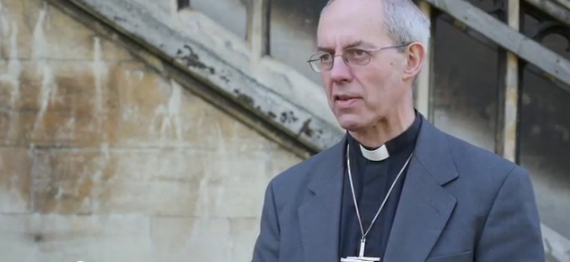Assisted dying devalues life, warns Archbishop of Canterbury
The Archbishop of Canterbury has warned that allowing terminally ill people to decide to end their lives would place unacceptable burdens on individuals and families. He said it would fundamentally change society's approach to the value of life.
Archbishop Justin Welby was speaking to Caroline Wyatt of the BBC as MPs prepare to debate today whether some terminally ill people in England and Wales should be allowed to end their lives under medical supervision.
He said: "In the situation of people coming towards the end of their life there are enough burdens without adding to them. And for society it is this accidental devaluation of the intrinsic value of life."

He added: "It's not something you take casually, but the moment you say life is deliberately ended with the full authority of the law rather than life being infinitely valued is a very big change."
Life was not that simple, the Archbishop said. "This will put burdens on individuals who feel they ought to do something and it will put burdens on families who worry about whether if they had done something different, then the outcome would have been different."
He told Wyatt that "fundamental change" was implied.
"We move from death being something that we all recognise the inevitability of, that is something to be challenged or come to terms with, to something to be caused. It changes our whole approach to the value of life to have assisted suicide."
The Archbishop warned: "Life ceases to be something to be treasured, in law the moment at which you have autonomy, and as I say, you'd have to be made of stone not to feel the sorrow and the grief that is involved in terminal illness."
He described facing this situation in his own family. "This is not something you take casually, but... the moment life is deliberately ended with the full authority of the law, rather than life being infinitely valued, is a very big change."
The legislation was an attempt to do something that is unrealistic, he warned.
"For me, it's essentially what we're doing is taking the untidiness, the difficulty of terminal illness, relationships, decisions about the future and trying to put them into a neat package. It is completely unrealistic - the world is not like that."
The bill, being brought before the House of Commons by Labour MP Rob Marris, does not begin to do what its supporters say, the Archbishop said. He said he believed the people supporting the bill are acting from the best of motives. "They are acting from profound compassion. These are not wicked people.
"But they say that firm and settled opinion excludes people who are deeply depressed. Psychiatrists say it takes six months to work out or more if someone is depressed. One of our children, as is very well-known, has suffered from depression... It took three or four years before it was recognised that she had depression.
"Life is not that tidy and to try to tidy it into a single act is impossible and will lead to things going seriously wrong and it will lead to people feeling a burden, that they ought to ask. It will lead to doctors being under huge pressure," the Archbishop said in the interview, according to a transcript given to Christian Today by Wyatt. The interview featured on BBC Radio 4's Today programme.

In a recent podcast for Things Unseen, his daughter Katharine Welby-Roberts spoke movingly about her battle with depression, saying of God: "He does not yank you out of the hole, he gets in there with you."
Asked by Wyatt whether he might not be out of step with the public mood, given that opinion polls show 80 per cent of people say they want the legislation passed, the Archbishop said: "There's a danger, as we all know, you can get very different results depending on the question. But that doesn't mean if you disagree you should shut up. You know, we say what we think, the House of Commons will make its own decision, it's not that the people proposing it are wicked, quite the reverse but this is misguided, it's not the right way of dealing with it - the present law does it very very well indeed and has done for many years."
Most Christians and church leaders side with Archbishop Welby on the issue.
Among those who disagree with him is Lord Carey of Clifton, former Archbishop of Canterbury. In a separate interview, Lord Carey told Caroline Wyatt: "There is nothing dignified about experiencing pain it at most awful point, and therefore so I felt compelled to say 'no, I'm going to fight for this'.
"I believe we must give people the right to have the help of a physician as they face their last moments, to be with their friends, with their family to have a prayer for them, maybe as a doctor gives them the help they need to end their suffering. People often say we wouldn't allow a dog to die in such circumstances in such agony and I go along with that. This is our opportunity to move this along."
He acknowledged he had shocked a few friends by changing his position. "I was for many years very much against it, and when I saw some of the people in excruciating pain - locked in syndrome - not in charge of his own life, and I began to think more that the main opposition to change was based on fear and what would happen, the slippery slope and I thought we can... Is it really compassionate to allow people to suffer with such indignity?"
Canon Peter Holliday, chief executive of St Giles Hospice, Walsall and deputy chair of Hospice UK, warned that people would quit the medical profession if the law was passed.
"We have staff here who would leave if the hospice was in any way compelled to offer assisted suicide and my concern then is about the potential for compulsion. A third of our funding comes from the NHS and that comes to us through local commissioners. If assisted suicide is legalised, they'll look to the local NHS for provision and local commissioners could expect us to offer that, and could make it a condition of our grant funding."
If passed, there would b e pressure not just from NHS commissioners but potentially from patients and families to consider it as a treatment option, he said in a podcast for the Church of England. "Where that would put those of our staff who really can't contemplate the idea, as an organisation trying to bring quality of life to vulnerable people, and give them security and care, to be consider as a treatment option, opens up a huge can of worms."











